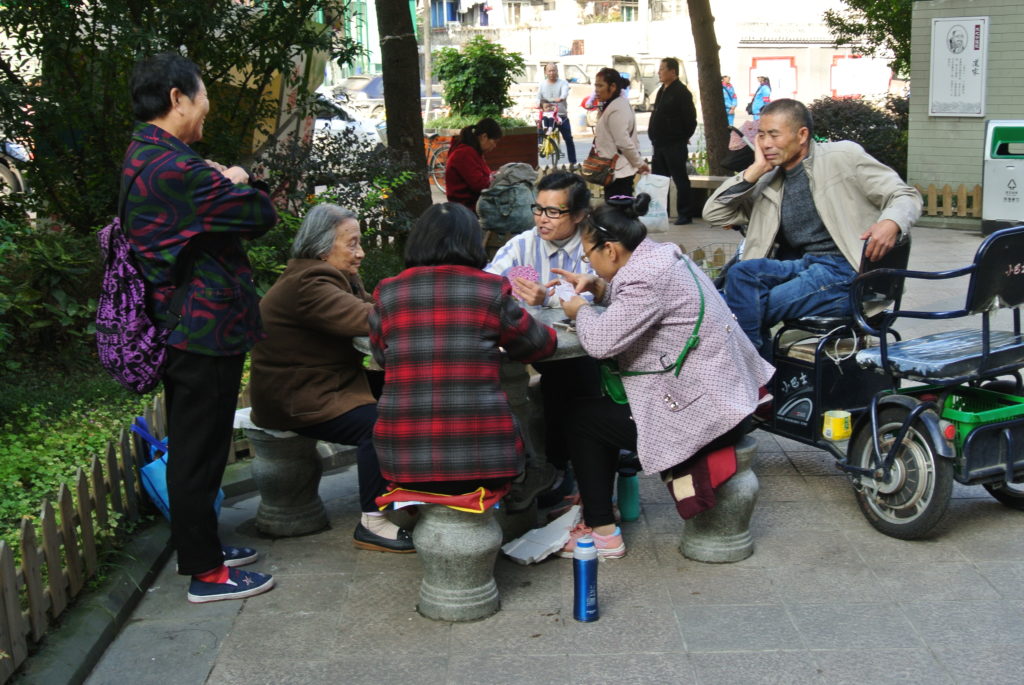Introducing the AALCIG Invited Session for the 2018 Meeting of the American Anthropological Association in San Jose. The panel is scheduled for Nov. 15, 2:00-3:45pm, Fairmont, Room Glen Ellen (details below). Featured image: Pill cups in a dementia ward (credit Lillian Prueher)
By Claudia Huang and Lillian Prueher
The idea for this panel first came to us when we were both conducting research for our respective dissertation projects in Chengdu, the capital of Sichuan Province in China. Though we study very different aspects of aging and eldercare in urban China, we found ourselves comparing notes and, when asked about our projects by mutual friends, a shorthand quickly evolved: Lillian studies aging within Chinese elder care institutions, and Claudia studies the older adults trying to stay out of them. The deeper we each got into our own projects on institutional and community-based elder care in China, the more exciting we found the idea of broadening and further contextualizing our conversations from the field. This panel is our attempt to bridge discussions related to elder care provision and aging throughout East Asia from different scholarly perspectives.
East Asia is now one of the fastest-aging regions in the world. As scholars with diverse perspectives on this phenomenon in different countries within this region, we highlight the ways in which technologies of care, economic circumstances, and ethical dilemmas entangle with eldercare practices. With two discussants – John W. Traphagan (UT Austin) giving a theoretical overview of the field prior to the talks and Andrew Kipnis (Australian National University) commenting on the papers after they are presented – this panel is designed to be accessible to those with a deep knowledge of East Asian Studies as well as those who are exploring aging in other regional contexts. Bringing together papers from Priscilla Song (University of Washington in St. Louis), James Wright (University of Hong Kong), Seonsam Na (Bronco Memorial Hospital) and those of the two organizers, this panel is geared toward attendees interested in the medical anthropology of aging, relationships between globalization and care, STS, political economy, and comparative ethnography. We hope that scholars with overlapping interests will join us at the AAA meetings in San Jose for what promises to be a fruitful conversation.

SESSION DETAILS
(3-0885) Moral Entanglements and Moral Economies of Elder Care in East Asia
This panel brings together ethnographic studies from East Asia to explore how economic transformation and the reconfiguration of state-society relations have changed the ways that people enter and inhabit old age. Despite following radically different economic and political trajectories in the last hundred years, China, Japan, and Korea have all arrived at critical junctures in their efforts to address their aging populations. We are less concerned with teasing out the particular relationships between aging trends and the policies or circumstances that precipitated them. Instead, we wish to take each nation’s complex recent histories into account in order to engage more critically with questions about what it means to grow old in these societies in the twenty-first century. How do technologies and practices of care emerge and take on moral resonance in these nations’ respective cultural and economic contexts? What new ideologies of aging and moral personhood do state actors, NGOs, and institutions of care promote in their policies and programming? How are these ideas transmitted through the ways that old age is talked about, treated, and planned for? How are they enacted and/or undermined by various actors who interact with elders? Finally, how do the elders themselves—who have already lived through dramatic social changes during their lifetimes– navigate these new realities to confront physical and mental decline, and ultimately their own mortalities? Such conversations have been taking place for several decades in Japan, but are just now emerging elsewhere in East Asia. This panel helps to bridge these conversations and provides an opportunity for scholars with different epistemological orientations to engage with one another. From expensive life-saving interventions in Chinese hospitals to robotic technologies in Japanese eldercare institutions, Priscilla Song and James Wright examine how the latest scientific discoveries interact with pre-existing moral frameworks. Noting the fraught contradictions that arise from the marketization of care, Lillian Prueher’s paper on decision-making in a Chinese eldercare facility and Seonsam Na’s paper on changing marketing strategies in a Korean hospital both investigate the reorganization of traditional hierarchies in the context of market reforms. Finally, Claudia Huang’s paper on how the “productive aging” concept materializes in Chinese programs aimed at recent retirees offers a critical view of how new expectations about the life course alters models of moral personhood for elders. The panel begins with an overview of the theoretical foundations of the field from John Traphagan and concludes with remarks from Andrew Kipnis, who will contextualize the panelists’ findings within these broader discourses. In crossing both geographic and theoretical boundaries, this panel aims to foster a more holistic discourse on aging and end-of-life care in East Asia.
Organizers:
Lillian Prueher -
University of Washington,
Claudia Huang
- UCLA
(Chair)
Presentations:
Biotech Interventions, Moral Entanglements, and the Everyday Practices of Critical Care in Urban Chinese Hospitals
Priscilla Song – The University of Hong Kong
Everyday ethical negotiations of robot care use in Japanese elderly nursing homes
James Wright – The University of Hong Kong
Filial Piety in the Market: Hospitalization of Elder Care and the Changing Landscape of Medical Business-making in South Korea
Seonsam Na – School of Anthropology, University of Oxford
Money, Choice, and Elder Care in Urban China
Lillian Prueher – University of Washington
No time wasted: productive aging in urban China
Claudia Huang – UCLA
Discussants
Andrew B. Kipnis – Chinese University of Hong Kong
Discussion
John Traphagan – University of Texas
